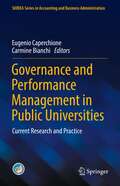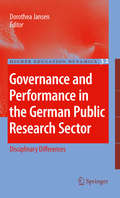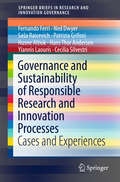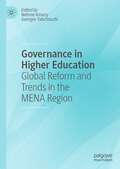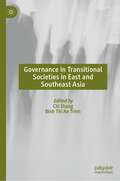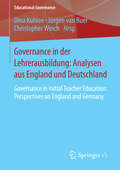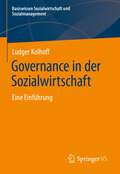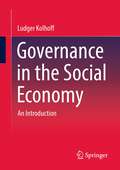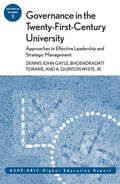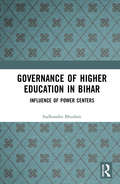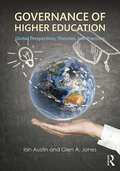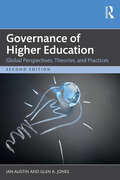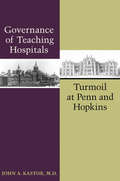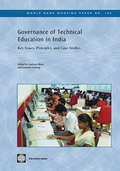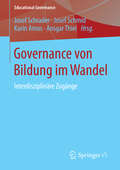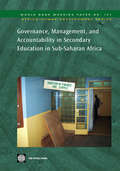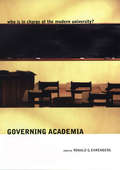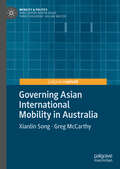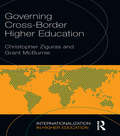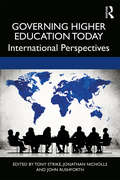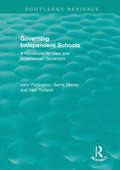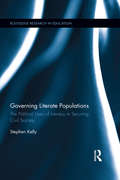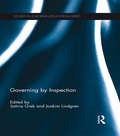- Table View
- List View
Governance and Performance Management in Public Universities: Current Research and Practice (SIDREA Series in Accounting and Business Administration)
by Eugenio Caperchione Carmine BianchiThis edited volume contributes to the ongoing research and practice on applying performance management to university governance. A comparative approach and international perspective of the issue is provided through extensive use of case studies and empirical findings. A specific focus is also placed on using performance governance applied to higher education institutions' Third Mission, and on enhancing decision makers’ ability to frame dynamic complexity. In this regard, specific attention is devoted to analyzing the cause-and-effect relationships in affecting public outcomes. This also includes managing trade-offs in both time and space, and detecting and counteracting unintended behavioral effects from the use of formal systems focused on quantitative measures for performance assessment.
Governance and Performance in the German Public Research Sector
by Dorothea JansenToday, higher education and research institutions are confronted with variable and sometimes contradictory demands from state, industry and society. They have to face growing volatility in education policy, and a research paradigm that sees an accelerating rate of knowledge growth as well as the internationalization of the knowledge process itself. It is vital that academics and policymakers stay abreast of the impact that policy changes have on education and research in tertiary institutions. Based on a sector-specific theory model for the governance of research organizations, this book outlines evidence of the effects of the so-called 'new public management reforms' in the German university and public research sector. The volume aims to shed some light on the differences between the disciplines in input, throughput, profiles of output and the typical conditions of knowledge production, disparities that are currently little understood and are thus not reflected in government policy as ministers implement new governance forms in the research system. It analyzes in detail these new forms, and demonstrates how they affect knowledge production and research performance from the level of research group up to that of the system itself. The authors focus on a set of disciplines that represent the breadth of research divisions in major universities: natural science fields oriented to basic research (astrophysics), two application-oriented fields from the natural sciences (nanoscience and biotechnology), a social science field (economics) and a humanity field (medieval history).
Governance and Sustainability of Responsible Research and Innovation Processes: Cases and Experiences (SpringerBriefs in Research and Innovation Governance)
by Hans Thor Andersen Fernando Ferri Ned Dwyer Saša Raicevich Patrizia Grifoni Husne Altiok Yiannis Laouris Cecilia SilvestriThis book provides methods and practical cases and experiences with the aim of stimulating Responsible Research and Innovation (RRI) through the direct engagement of researchers, Civil Society Organisations (CSOs), citizens, industry stakeholders, policy and decision makers, research funders and communicators. The book furthermore aims to advance debate on Responsible Research and Innovation and also to reinforce the RRI community identity. With chapters covering governance, public engagement and inclusion in responsible R&D and innovation processes; RRI actions in science education and communication; gender and ethical issues in RRI initiatives; and sustainability of RRI processes, the book is solidly part of the Europe 2020 strategy to promote a vision for a stronger collaborations between social, natural and physical scientists and the societal actors for a wider dimensions of science and innovation and the role in environmental preservation.
Governance grenzüberschreitender Professionalisierung und gesellschaftlicher Integration: Strategien und multiple Rationalitäten beim Aufbau eines kommunalen Bildungsmanagements (Educational Governance #57)
by Katharina LüthiIn diesem Open-Access-Buch wird den Fragen nachgegangen, wie der Akteur Kommunales Bildungsmanagement kollektive Handlungsfähigkeit herstellt und welchen Beitrag diese Koordinationsarbeit zur gesellschaftlichen Integration leistet. Die Rekonstruktion von Arenen, die in einem komplexen Geflecht von Integrationsräumen zusammenwirken, basiert auf Interviewdaten der wissenschaftlichen Begleitforschung zum Programm Lernen vor Ort. Ausgehend von dem Verständnis eines Theorie-Methodenpakets zwischen der interaktionistischen Handlungstheorie und der Grounded-Theory-Methodologie werden zentrale Herausforderungen der Governance-Forschung mithilfe der Zeigestruktur der Erziehung zu einer prozessbezogenen pädagogischen Organisationsforschung zusammengeführt.Dies ist ein Open-Access-Buch.
Governance in Higher Education: Global Reform and Trends in the MENA Region
by Nehme Azoury Georges YahchouchiOver the years, the education sector has witnessed substantial transformations and developments, driven primarily by the rapid growth of technology and inventive pedagogical approaches. In the MENA region, these changes have been particularly noteworthy, as educational institutions are striving to keep pace with global advancements while addressing unique regional challenges. Set against this context, this book delves into two pivotal dimensions that have surfaced as vital for thriving in today's educational sphere, with a strong emphasis on the MENA region's distinct characteristics and opportunities. The first dimension explores the evolution and challenges in governance, encompassing the organizational frameworks, decision-making mechanisms, and policies that empower educational institutions in the MENA region to adapt to the shifting environment. The second dimension zeroes in on the metamorphosis of education itself, emphasizing the innovative tools, assignments, and methodologies that are accessible to educators in the region, and discussing the balance between these elements and effective university governance. By offering an exhaustive and up-to-date examination of these two dimensions, this book imparts invaluable insights and pragmatic guidance to educational professionals, policymakers, and students alike, all with a focus on the MENA region. It aims to equip readers with the knowledge and abilities required to successfully navigate the new educational landscape and excel in the world of academia while highlighting the unique potential and prospects of the region's educational institutions.
Governance in Transitional Societies in East and Southeast Asia
by Chi Zhang Binh Thi An TrinhThis book brings together scholars based in, or had previously been based in a range of East and Southeast Asian countries, building on their respective primary empirical data and first-hand experience as academics and think tank researchers, in order to pluralise the current debates about governance in transitional societies. In an era of global democratic backsliding, this edited volume offers less-explored local perspectives, to balance the Western-centrism observed in area studies and the focus on former Soviet countries in transit. What is the future of governance in Asia? This book, by attempting to supply a diversity of answers, will interest political scientists, economists, and journalists.
Governance in der Lehrerausbildung: Analysen aus England und Deutschland
by Dina Kuhlee Jürgen Buer Christopher WinchDie Publikation beschäftigt sich mit den Lehrerbildungsstrukturen in England und Deutschland und deren Wandel unter bildungspolitischen Reforminitiativen. Trotz Parallelen in Reformdiskursen und -instrumenten, hinsichtlich der praktischen Fokussierungen und Wirkungen von Reforminitiativen existieren deutliche Differenzen. Die Beiträge deuten dabei darauf, dass die Durchsetzung bildungspolitischer Steuerungsmaßnahmen bis in die Mikroebene von Lehrerausbildung und Lehrprofession letztlich scheinbar stringenter in den marktorientierten Strukturen Englands gelingt als in den stark staatlich-reglementierten Strukturen Deutschlands. Governance in Initial Teacher Education: Perspectives on England and Germany This publication examines institutional structures in Initial Teacher Education (ITE) in England and Germany and changes to these prompted by political reform. Although there are parallels in the discourses concerning reforms to ITE in both countries, the focus and the outcomes of the reforms differ. The contributions to the book indicate that the micro-level implementation of educational governance measures appears to be more stringent in the English market-oriented structure than in the strongly state-regulated structure of the German Federal State.
Governance in der Sozialwirtschaft: Eine Einführung (Basiswissen Sozialwirtschaft und Sozialmanagement)
by Ludger KolhoffIn diesem Lehrbuch werden Governance-Aspekte auf verschiedenen Ebenen verständlich dargestellt und erläutert: Nach einem Blick auf die wirtschafts- und politikwissenschaftlichen Wurzeln der Governance-Diskussion werden auf der Makroebene „Orders of Governance“ politische und ökonomische Aushandlungs- und Problemlösungsprozesse erörtert und institutionelle und normative Rahmenbedingungen betrachtet; auf der Mesoebene „Cooperation“ geht es um Formen der Steuerung und der Kontrolle sowie um die Kooperation und Koordination von sozialwirtschaftlichen Unternehmen; und auf der Mikroebene „Interactions“ wird Governance aus der Perspektive der Akteure und ihrer Interaktionen behandelt.
Governance in the Social Economy: An Introduction
by Ludger KolhoffIn this textbook, governance aspects are presented and explained in a comprehensible way at different levels: After a look at the roots of the governance discussion in economics and political science, political and economic negotiation and problem-solving processes are discussed on the macro level "Orders of Governance" and institutional and normative framework conditions are considered; on the meso level "Cooperation", forms of steering and control as well as cooperation and coordination of social economy enterprises are dealt with; and on the micro level "Interactions", governance is dealt with from the perspective of the actors and their interactions.
Governance in the Twenty-First-Century University
by Dennis John Gayle Bhoendradatt Tewarie A. Quinton WhiteExplores approaches to effective leadership and strategic management in the twenty-first century university that recognize and respond to the perceptions and attitudes of university leaders toward institutional structures. It examines the differences between treating universities as businesses and managing universities in a businesslike manner, what kinds of leadership will best address challenges, and how to gain consensus among constituents that change is needed. From historical background to modern e-learning techniques, we look at governance to find systems that are effectively structured to balance the needs of students, educators, administrators, trustees, and legislators.
Governance of Higher Education in Bihar: Influence of Power Centers
by Sudhanshu BhushanThis book presents the state-specific dimensions of the governance of higher education in Bihar, India, based on a real-case perspective. It discusses the policies of the center and state governments, and their implications on the state's higher education system. It addresses the issues and challenges faced by the higher education sector from the point of view of multiple stakeholders at center, state, university and college levels, while examining influential power centers. The volume focuses on select universities in the state and looks at how they manage policies, schemes and regulations. It deals with key themes such as the role of state and regulatory bodies such as the University Grants Commission; the balance of power; resource scarcity; the inadequacy of top-down governance models; governance failure; and the autonomy of universities. It explores the conflict between the politics and economics of governance and efficiency; the promotion and recruitment of senior office-bearers and teachers; the privatization of colleges; and financing, admission and examination systems. Through an in-depth study using empirical unit-level data from the All-India Survey of Higher Education, examples and theoretical frameworks, the book analyzes the reasons for the underperformance of the governance system of higher education in Bihar. It also offers suggestions and policy recommendations to help improve its planning and management via participative and responsible governance and informed institutional leadership. This book will be of interest to students, teachers and researchers of education, higher education, economics, governance and public administration, and development studies. It will also be useful to educationists and experts, education administrators, policymakers, bureaucrats and the governing bodies of higher education institutions.
Governance of Higher Education: Global Perspectives, Theories, and Practices
by Ian Austin Glen A. JonesGovernance of Higher Education explores the work of traditional and contemporary higher education scholarship worldwide, providing readers with an understanding of the assumptions, historical traditions, and paradigms that have shaped the scholarship on governance. Bringing together the vast and disparate writings that form the higher education governance literature—including frameworks drawn from a range of disciplines and global scholarship—this book synthesizes the significant theoretical, conceptual, and empirical scholarship to advance the research and practice of governance. Coverage includes the structures of governance, cultures and practices, the collegial tradition, the new managed environment of the academy, and the politics and processes of governance. As universities across the globe face a myriad of challenges and multiple stakeholder demands, Governance of Higher Education offers scholars, practitioners, and higher education graduate students an essential resource for advancing research and the practice of governance.
Governance of Higher Education: Global Perspectives, Theories, and Practices
by Ian Austin Glen A. JonesThe new edition of Governance of Higher Education explores the work of traditional and contemporary higher education scholarship, providing readers with an understanding of the assumptions, historical traditions, and paradigms that have shaped the scholarship on governance worldwide.Updated throughout to reflect current higher education governance research and with expanded discussion of key theories and new relevant concepts, this book brings together vast and disparate writings, including frameworks drawn from a wide range of disciplines and newly bolstered case studies. Coverage includes the structures of governance, cultures and practices, the collegial tradition, as well as newfound critique of outdated organizational theory, leadership concepts, quality assurance and accountability, and system governance. Furthermore, this work synthesizes the significant theoretical, conceptual, and empirical scholarship to advance research and practice of governance.As universities across the globe face a myriad of challenges and multiple stakeholder demands, Governance of Higher Education offers scholars, practitioners, and higher education graduate students an essential resource for advancing research and the practice of governance.
Governance of Teaching Hospitals: Turmoil at Penn and Hopkins
by John A. KastorWhat forces lead to changes in governance among medical schools and their associated teaching hospitals? To what extent do such changes affect how well those schools and hospitals do their work? In this book, John A. Kastor, M.D., focuses on the academic medical centers of the University of Pennsylvania and the Johns Hopkins University, two institutions that underwent dramatic change in governance during the late 1990s.Drawing on extensive interviews with more than three hundred administrators, physicians, and other medical professionals at Penn, Hopkins, and elsewhere, Kastor identifies the factors that influenced changes in governance at these two institutions. Chief among these, he finds, are structure, personality conflicts, and current events. This book will be of interest to administrators of teaching hospitals as well as professionals in health policy and management.
Governance of Technical Education in India
by Andreas Blom Jannette CheongReforms are imperative for the huge and complex technical education system in India. A recent Learning Forum brought together senior policy makers and institutional leaders that elaborated a nine-point agenda to achieve good governance, a key to successful reforms in this area. The forum agenda and this paper build upon studies summarizing generic trade-offs, challenges, and experiences, from five Indian state governments, and global failures and successes, to balance demands for greater institutional autonomy with the government's need to direct strategic economic development and enhance participation in higher education.
Governance through Social Learning
by Gilles PaquetThis book rejects these simplistic views in favour of a more distributed view of governance based on a mix of coercion, quid pro quo market exchange and reciprocity, on a division of labour among the private, public, and civic sectors, and on the co-evolution of these different integration mechanisms.
Governance von Bildung im Wandel
by Josef Schrader Josef Schmid Karin Amos Ansgar ThielIn den letzten Jahren sind tiefgreifende Veränderungen der institutionellen Regelungsstrukturen der europäischen Bildungssysteme zu beobachten. Inzwischen hat sich mit der Educational Governance ein eigenständiger Forschungsbereich etabliert, der sich der Transformation von Steuerungsformen im Bildungsbereich zuwendet. Ziel des vorliegenden Bandes ist die Analyse der veränderten Governance-Praxen. Die Aufmerksamkeit der empirischen Beiträge ist dabei vor allem auf national und sektoral unterschiedliche Prozesse und Wirkungen von Governance-Modi gerichtet. Darüber hinaus werden theoretische und methodische Weiterentwicklungen der interdisziplinär verstandenen Educational-Governance-Forschung zur Diskussion gestellt.
Governance, Management, and Accountability in Secondary Education in Sub-Saharan Africa
by World BankIncreasingly the role of management and governance is recognized as important for providing and delivering effective services at all levels of education. In view of the growing demand for more and better services at secondary education levels, these are crucial issues that must be addressed urgently. Sub-Saharan Africa's secondary education and training systems must become more efficient and more effective. The current (unit) costs of junior and senior secondary education in most African countries prevent massive expansion of post-primary education. This demands a holistic approach to governance and management issues. In parallel, there is a demand from civil society and governments for greater accountability. This study aims to present best practices and identify sustainable development plans for expansion and improved quality and efficiency in the delivery of secondary education in Sub-Saharan Africa through better governance, management, and accountability.
Governing Academia: Who Is in Charge at the Modern University?
by Ronald G. EhrenbergPublic concern over sharp increases in undergraduate tuition has led many to question why colleges and universities cannot behave more like businesses and cut their costs to hold tuition down. Ronald G. Ehrenberg and his coauthors assert that understanding how academic institutions are governed provides part of the answer.Factors that influence the governance of academic institutions include how states regulate higher education and govern their public institutions; the size and method of selection of boards of trustees; the roles of trustees, administrators, and faculty in shared governance at campuses; how universities are organized for fiscal and academic purposes; the presence or absence of collective bargaining for faculty, staff, and graduate student assistants; pressures from government regulations, donors, insurance carriers, athletic conferences, and accreditation agencies; and competition from for-profit providers.Governing Academia, which covers all these aspects of governance, is enlightening and accessible for anyone interested in higher education. The authors are leading academic administrators and scholars from a wide range of fields including economics, education, law, political science, and public policy.Contributors: Ronald G. Ehrenberg, Cornell University; James O. Freedman, Dartmouth College; Thomas H. Hammond, Michigan State University; Donald E. Heller, Pennsylvania State University; Benjamin E. Hermalin, University of California, Berkeley; Gabriel E. Kaplan, University of Colorado; Adam T. Kezsbom, Cornell University; Daniel B. Klaff, Cornell University; Susanne Lohmann, University of California, Los Angeles; Matthew P. Nagowski, Cornell University; Michael A. Olivas, University of Houston Law Center; Brian Pusser, University of Virginia; Sarah E. Turner, University of Virginia; John D. Wilson, Michigan State University
Governing Asian International Mobility in Australia (Mobility & Politics)
by Xianlin Song Greg McCarthyThis book examines the governance of Asian student and academic mobility, which has transformed the higher education landscape. While campuses are experiencing an unprecedented level of diversity, knowledge creation remains explicitly Eurocentric and dominated by the Global North. The authors advocate for a new educational paradigm that takes into account the transcultural flow of knowledge on campus as a public good, capitalises on Asian students and academics’ multilingual competencies, and offers them equal access to creating quality-orientated education. The book argues that international higher education must be grounded in both a plurality of knowledges and the ethics of cognitive justice, and that the governing policies should facilitate the higher education sector to build a platform of internationalising affect and effect on campus.
Governing Cross-Border Higher Education (Internationalization in Higher Education Series)
by Christopher Ziguras Grant McBurnieGoverning Cross-Border Higher Education examines the role of governments in relation to three key aspects of international education: student mobility; migration of international students; and transnational provision through collaboration or branch campuses. The research for this book is informed by interviews with key stakeholders in ten countries and extensive engagement with policy makers and international agencies. It analyses the ways in which governments are able to direct or at least influence these cross-border movements in higher education. The book explores key issues that national governments are invariably required to contend with in an increasingly globalised higher education market, as well as the policy options available to them in such a climate. Alongside this, there is analysis into why states adopt particular approaches, with critical assessment of their varying success. Key topics include: the political economy of international higher education; recruiting students; promoting and regulating transnational provision; student migration; governing educational imports; managing the outflow of students; the regulated market. This book will be a valuable and insightful resource for those involved in higher education policy and interested in the globalisation of the higher education market.
Governing Higher Education Today: International Perspectives
by Tony Strike Rushforth John Jonathan NichollsInternational growth in higher education, the introduction of new providers and increased public and state interest in university structures, levels of fees and funding models have made governance in higher education a vital and sometimes controversial topic. Governing Higher Education Today provides challenging perspectives on the longer-term dynamics and policy trends in a world market for higher education. Through international perspectives and case studies, it considers: The emerging national responses, which are likely to shape institutional governance in the next decade. An analysis of the trends and strategic directions in governance and policy in higher education. Insights from practising thought leaders on the future of higher education governance and policy. Traditions and values within higher education governance. Lessons and trends in the interaction of institutions and government. Whether you sit on a governing body, work in a university leadership role or in a governance or policy team, teach or study higher education, Governing Higher Education Today provides a thoughtful yet practical guide to the future of university governance with international applicability.
Governing Independent Schools: A Handbook for New and Experienced Governors (Routledge Revivals)
by John Partington Barrie Stacey Alan TurlandGovernors are a valuable but under-used asset to independent schools. Under the day-to-day pressures of running schools, they are too often sidelined, yet are frequently called to account by parents and the media when things go wrong. Both new and experienced governors of independent schools will welcome this lively and informative handbook, originally published in 1998, which describes the positive and constructive role which governing bodies can play in the life of their schools. It provides up-to-date management techniques which can be effectively applied to enhance the quality of education and thereby the attractiveness of schools to parents and students.
Governing Literate Populations: The Political Uses of Literacy in Securing Civil Society (Routledge Research in Education)
by Stephen KellySecuring the hearts and minds of ‘dangerous’ populations is a major concern for governments across the world. Governing Literate Populations shows how ‘governmentalities’ have deployed education and literacy in different ways in order to protect their national, social, economic and geopolitical security interests. Presenting a Foucauldian Genealogy of literacy and education, Kelly argues that government apparatuses strategically contain the rise of complex social forces to protect homogenous cultural values. Kelly’s work traces the development of the relationship between liberal governmentalities and the securitization of ‘martial’ literate citizenries from its beginnings in the Enlightenment, starting with Hobbes’ Leviathan in 1651, through to the emergence of human security in 1994. He then examines the situation in Australia from 1995-2007, investigating political statements by the Howard Government and the insurgent Rudd opposition against the backdrop of the ‘age of terror’. The conclusion takes another historical cut by considering how the political uses of literacy can be located in the texts of Plato, before examining how the conceptualization of literate subject as citizen of the state has come to be realized in the United Kingdom and the United States of America. Governing Literate Populations draws on data obtained from historical texts, including political and economic treatises, publications by NGOS, media sites, government policies and archived political speeches. As such, it will appeal to academics, researchers and postgraduate students examining education policy and the political uses of education, as well as literacy education and the history of education. Those with an interest in politics, sociology and history will also find this work a highly informative resource.
Governing by Inspection (Studies in European Education)
by Sotiria Grek Joakim LindgrenIn recent decades, governing practices in education have become highly contradictory: deregulation and decentralisation are accompanied by re-regulation and increased centralisation, contributing to considerable governing tensions in and across different national systems and within the emergent European education policy space. On the one hand there is the persistence of performance monitoring through target-setting, indicators and benchmarks, and on the other, the promotion of self-evaluation and ‘light touch’ regulation that express a ‘softer’ governance turn, and promote self-regulation as the best basis for constant improvement. Drawing on research undertaken into three national systems, this edited volume explores the attempts to manage these tensions in Europe through the development of inspection as a governing practice. Inspectorates and inspectors offer key locations for the exploration of governing tensions, positioned as they are between the international, the national, and the local and institutional, and with responsibility for both regulation and development. All three national systems offer contrasting approaches to inspection, all of which have changed considerably in recent years. Governing by Inspection positions inspection in the framework of changing education policy and politics, and in a period of intensive policy development and exchange in Europe. It will be key reading for academics, researchers and postgraduate students in the fields of education, political science and social policy.
